I was planning to write my next blog post about “My Top 10 Favorite Anime,” but changed my mind due to astonishing new information has emerged about Thomas Lockley rewriting Yasuke’s Wikipedia page.
Writing about how and why he edited Wikipedia turned out to be quite lengthy. Therefore, I’ve split this article into two parts: Part 1 (How He Edited Wikipedia: The Facts) and Part 2 (Why He Tried to Rewrite History: My Speculations).
For this first part, I referred to an article by STST-san and posts by ラム・マイヤーズ-san. Checking each edit history on Wikipedia is an arduous task, and I appreciate their patience.
In this part, we’ll examine how the user Tottoritom, who is said to be Thomas Lockley himself, edited Yasuke’s page and the adverse effects of those edits.
To conclude, he turned the page of Yasuke, which no one had thoroughly researched (due to a lack of sources), into a place filled with errors and his own speculative research findings. While it may be common knowledge in academia that Wikipedia isn’t a reliable source, the adverse effects on the general public abroad are immeasurable.
- Why Tottoritom Is Believed to Be Thomas Lockley
- Edit History of Yasuke on Wikipedia by Tottoritom
- September 2015: Tottoritom added his own future paper, to be published in 2016, as a reference.
- October 2015: Tottoritom introduced the absurd theory that Yasuke was an incarnation of Daikokuten.
- February 2017: Tottoritom removed his above-mentioned paper and replaced it with the book ‘Nobunaga and Yasuke.’
- February 2018: A sensible Wikipedian cleaned up speculative articles, conjectural articles, and fabricated citations.
- October 2018: Tottoritom created the article of Thomas Lockley on Wikipedia and got scolded for it.
- January 2019: Tottoritom advertised his novel at the end of Yasuke’s article.
- Afterward: Tottoritom disappears
- Did Thomas Lockley Use Wikipedia for Research Presentation?
- Thomas Lockley’s Current Rewrite of Britannica
- Lockley’s Influence on the Public Abroad
- Conclusion: Thomas Lockley Rewrote History on Wikipedia, and the World Was Deceived
Why Tottoritom Is Believed to Be Thomas Lockley
Self-Declaration on Wikipedia Profile
Tottoritom claims in his profile that Tottoritom is Thomas Lockley.

Tottoritom is Thomas Lockley an faculty member at Nihon University College of Law, Tokyo, Japan. His interests are primarily Japanese history related.
Cited from: https://en.wikipedia.org/wiki/User:Tottoritom

It is almost certain, but let’s also consider the other evidence
Used to Live in Tottori
It is said that the name Tottoritom comes from his time working as an ALT (Assistant Language Teacher) in an elementary school in Tottori Prefecture for two years. In an interview with the Refugee Support Association, he mentioned:
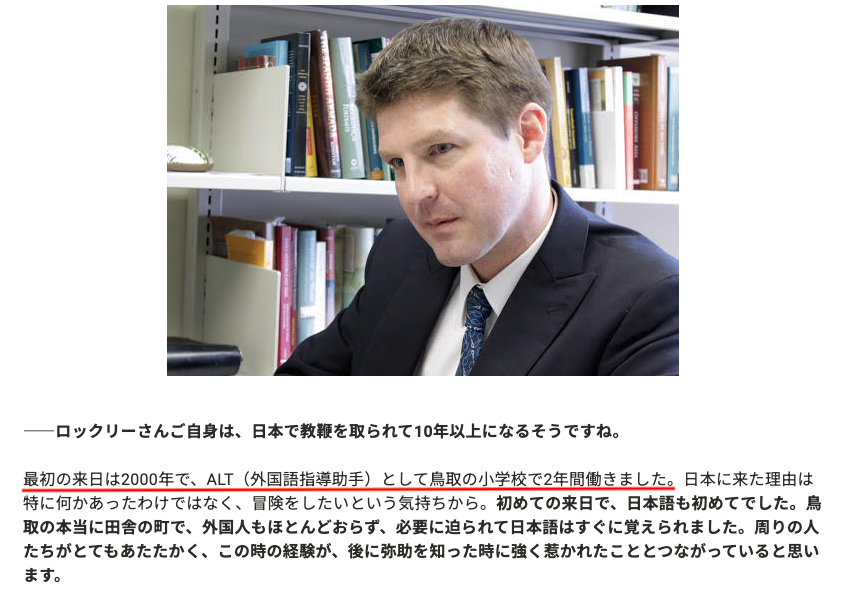
最初の来日は2000年で、ALT(外国語指導助手)として鳥取の小学校で2年間働きました。日本に来た理由は特に何かあったわけではなく、冒険をしたいという気持ちから。初めての来日で、日本語も初めてでした。鳥取の本当に田舎の町で、外国人もほとんどおらず、必要に迫られて日本語はすぐに覚えられました。周りの人たちがとてもあたたかく、この時の経験が、後に弥助を知った時に強く惹かれたこととつながっていると思います。
Translation:
Cited from: https://www.refugee.or.jp/report/activity/2020/02/post_501/
My first visit to Japan was in 2000, when I worked as an ALT (Assistant Language Teacher) at an elementary school in Tottori for two years. There wasn’t any specific reason for coming to Japan; I just had a desire for adventure. It was my first time in Japan, and I didn’t know any Japanese. In Tottori, a truly rural town with very few foreigners, I quickly learned Japanese out of necessity. The people around me were very warm and welcoming, and I believe this experience strongly influenced my fascination with Yasuke when I later learned about him.
Adding Lockley’s Unpublished Papers as References
In 2015, he added the 2016 upcoming papers by Lockley as a reference on Wikipedia.
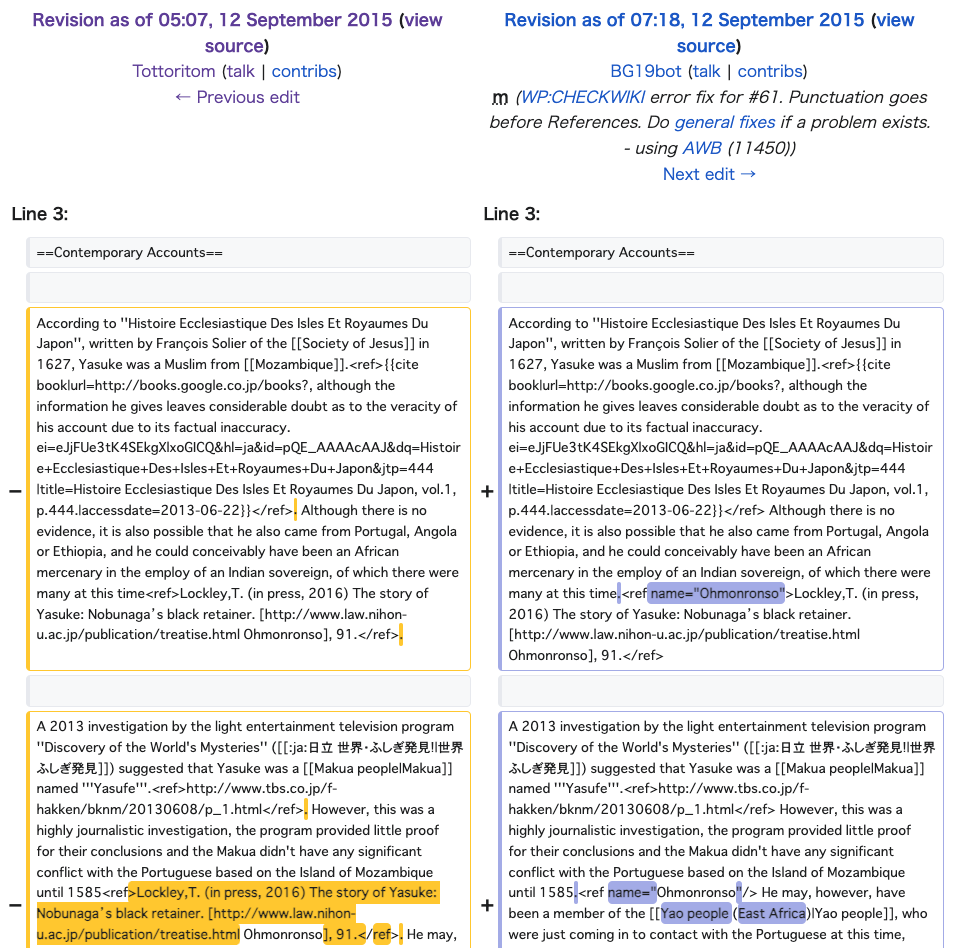
Lockley,T. (in press, 2016) The story of Yasuke: Nobunaga’s black retainer. Ohmonronso, 91.
Cited from: https://en.wikipedia.org/w/index.php?title=Yasuke&oldid=680634561
Facebook Account Name
His another Facebook account name is tottoritom. The wayback machine records prove that he used the Facebook account tottoritom.
https://www.facebook.com/tottoritom (now closed)

And CASE CLOSED!
Edit History of Yasuke on Wikipedia by Tottoritom
Given the above, it’s almost certain that Tottoritom is Thomas Lockley. Let’s examine his edits:
September 2015: Tottoritom added his own future paper, to be published in 2016, as a reference.

Lockley,T. (in press, 2016) The story of Yasuke: Nobunaga’s black retainer. Ohmonronso, 91.
Cited from: https://en.wikipedia.org/w/index.php?title=Yasuke&diff=next&oldid=680634561
Most of the cited references were his yet-to-be-published papers, with a lot of phrases like:
- “it is also possible ~”
- “could conceivably ~”
- “may ~”
- “which might ~”
While suggesting possibilities is acceptable, the following are clear errors:
- Misinterpretation of height as “6 shaku 2 sun (6 ft. 2 in., or 188 cm.)“
- Fabrication of “the name Yasuke was bestowed upon him by Nobunaga himself, a deep honour in the Japan of the day” from ‘Ietada Diary’
- Nonsensical explanation that it is unlikely that Yasuke would have been able to communicate in classical Chinese, the oriental lingua franca of the time
- Stating Yasuke was granted the samurai rank which came with a considerable stipend
- Distortion of facts, claiming Yasuke fought alongside the Nobutada forces for a long time but when all his comrades had died, he surrendered his sword to Akechi’s men
October 2015: Tottoritom introduced the absurd theory that Yasuke was an incarnation of Daikokuten.
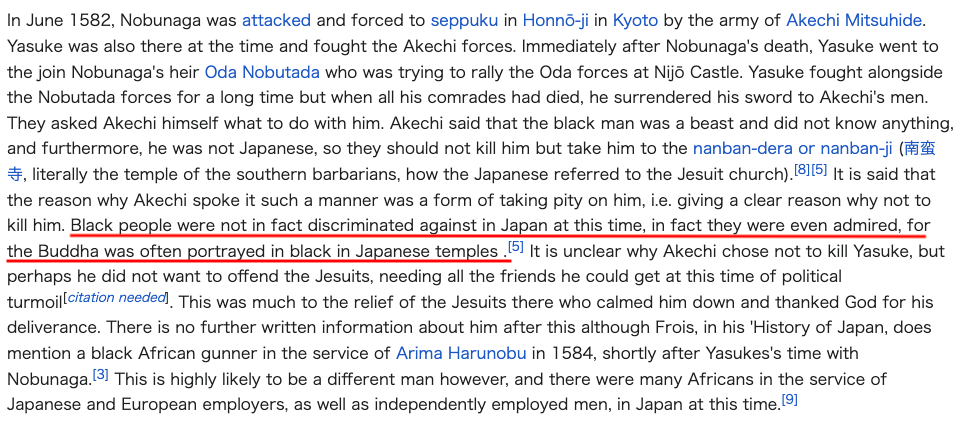
Black people were not in fact discriminated against in Japan at this time, in fact they were even admired, for the Buddha was often portrayed in black in Japanese temples.
Cited from: https://en.wikipedia.org/w/index.php?title=Yasuke&oldid=683673684
The cited reference is Midori Fujita’s ‘日本におけるアフリカ像の変遷 (The Transition of the African Image in Japan),’ but this book contains no such description:
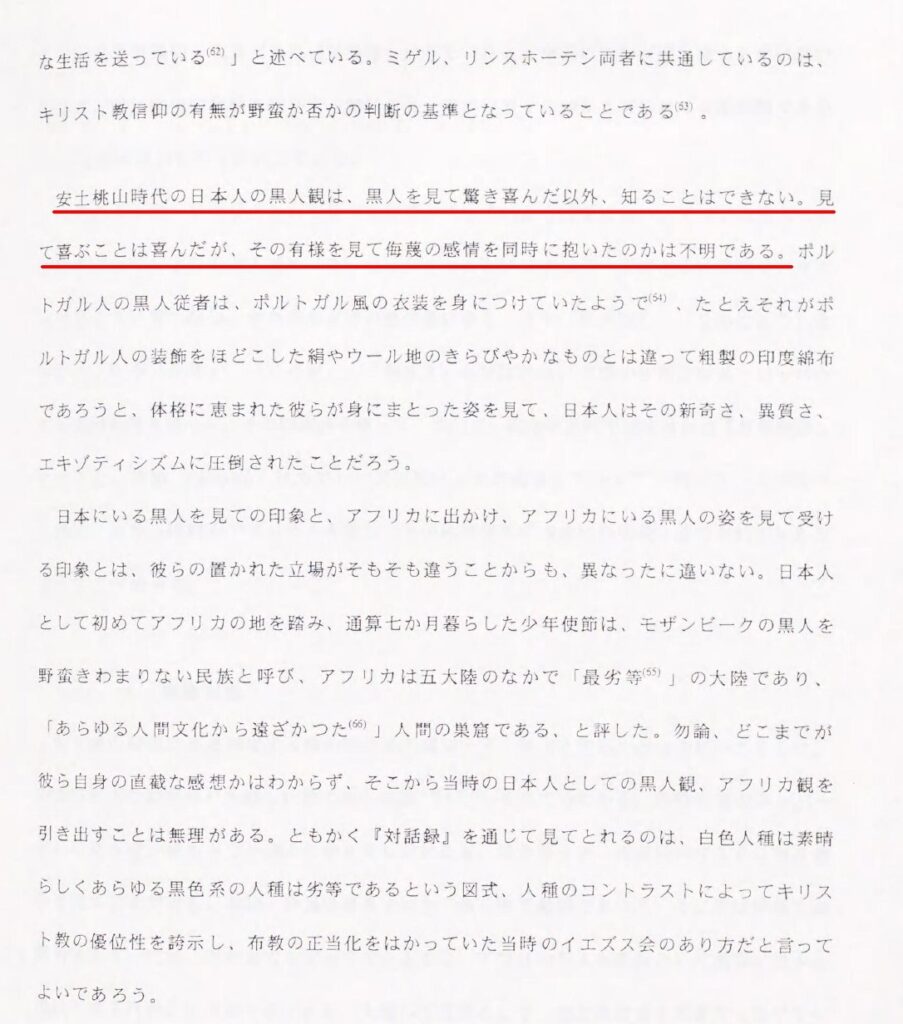
ロックリー氏の創作の権威付けに利用されているだけでした。『日本におけるアフリカ像の変遷』にそんな記述は存在しません。
「安土桃山時代の日本人の黒人観は、黒人を見て驚き喜んだ以外、知ることはできない。見て喜ぶことは喜んだが、その有様を見て侮蔑の感情を同時に抱いたかは不明である。」
Translation:
Lockley was merely using it to legitimize his creation. There is no such description in ‘日本におけるアフリカ像の変遷 (The Transition of the African Image in Japan.)’“The perception of black people during the Azuchi-Momoyama period in Japan is unclear except for the fact that they were surprised and delighted to see them. While they were pleased to see them, it’s uncertain if they simultaneously harbored contempt.”
Cited from: https://twitter.com/laymans8/status/1811757030367232487
February 2017: Tottoritom removed his above-mentioned paper and replaced it with the book ‘Nobunaga and Yasuke.’
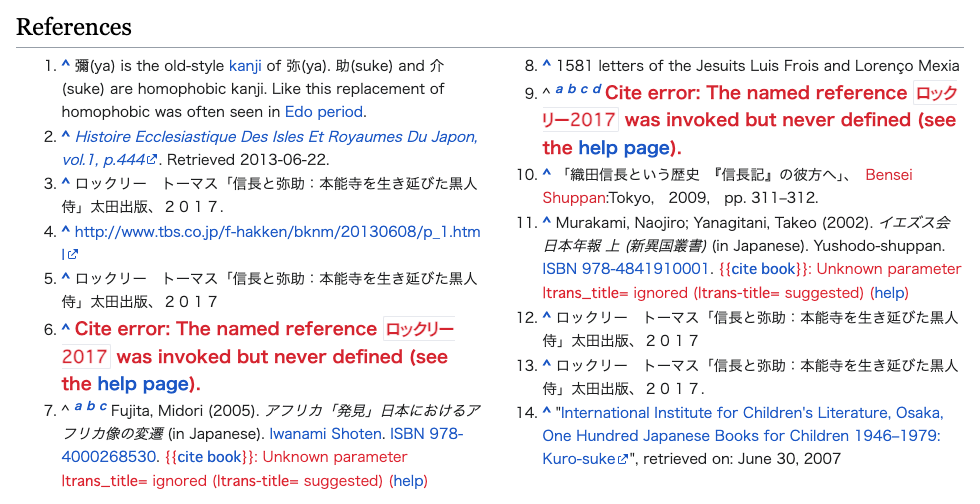
ロックリー トーマス「信長と弥助:本能寺を生き延びた黒人侍」太田出版、2017
Translation:
Cited from: https://en.wikipedia.org/w/index.php?title=Yasuke&oldid=763413844
Lockley, Thomas “Nobunaga and Yasuke: The Black Samurai Who Survived Honnoji” Ohta Publishing, 2017.
Apparently there were grammatical errors during the edit, which made some citations incorrect.
February 2018: A sensible Wikipedian cleaned up speculative articles, conjectural articles, and fabricated citations.
Speculative articles, conjectural entries, and fabricated citations were all removed.
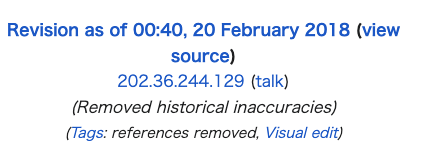
Removed historical inaccuracies
Cited from: https://en.wikipedia.org/w/index.php?title=Yasuke&diff=prev&oldid=826636444
It appears that this edit was made by an anonymous sensible editor from the University of Auckland.
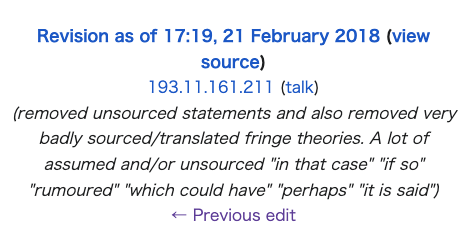
removed unsourced statements and also removed very badly sourced/translated fringe theories. A lot of assumed and/or unsourced “in that case” “if so” “rumoured” “which could have” “perhaps” “it is said”
Cited from: https://en.wikipedia.org/w/index.php?title=Yasuke&diff=next&oldid=826907278
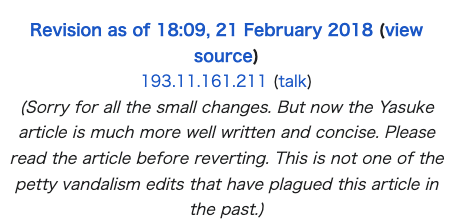
Sorry for all the small changes. But now the Yasuke article is much more well written and concise. Please read the article before reverting. This is not one of the petty vandalism edits that have plagued this article in the past.
Cited from: https://en.wikipedia.org/w/index.php?title=Yasuke&diff=next&oldid=826914012
October 2018: Tottoritom created the article of Thomas Lockley on Wikipedia and got scolded for it.
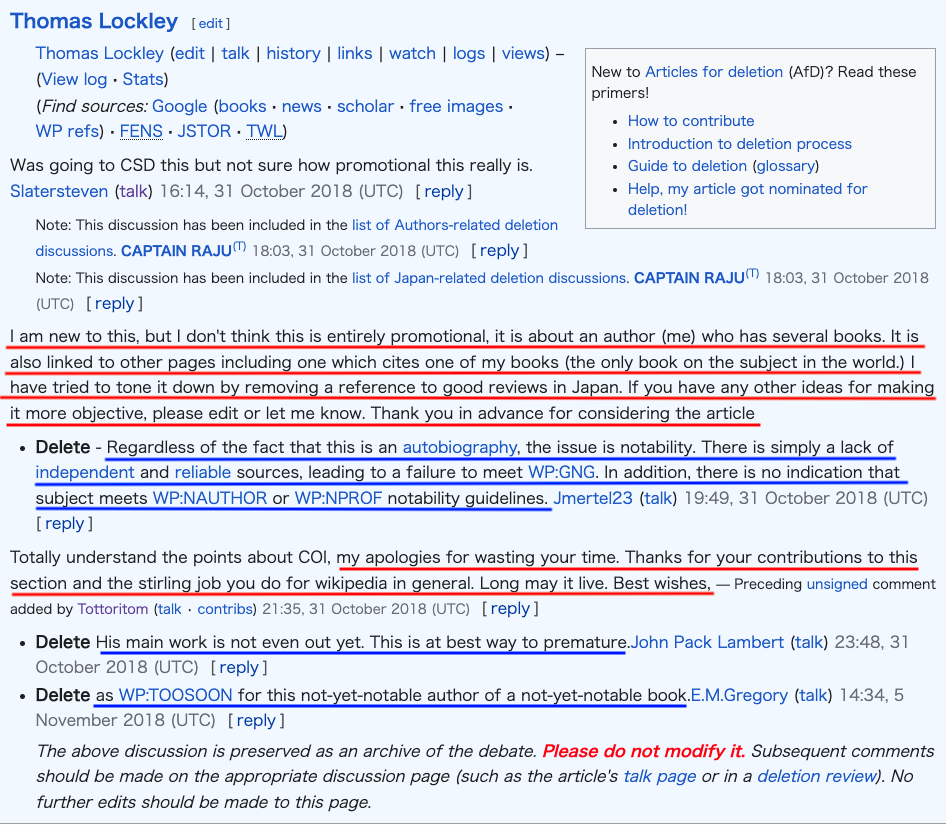
Tottoritom: I am new to this, but I don’t think this is entirely promotional, it is about an author (me) who has several books. It is also linked to other pages including one which cites one of my books (the only book on the subject in the world.) I have tried to tone it down by removing a reference to good reviews in Japan. If you have any other ideas for making it more objective, please edit or let me know. Thank you in advance for considering the article
Jmertel23: Delete Regardless of the fact that this is an autobiography, the issue is notability. There is simply a lack of independent and reliable sources, leading to a failure to meet WP:GNG. In addition, there is no indication that subject meets WP:NAUTHOR or WP:NPROF notability guidelines.
Tottoritom: my apologies for wasting your time. Thanks for your contributions to this section and the stirling job you do for wikipedia in general. Long may it live. Best wishes,
John Pack Lambert: Delete His main work is not even out yet. This is at best way to premature.
E.M.Gregory: Delete as WP:TOOSOON for this not-yet-notable author of a not-yet-notable book.

I want to comfort him
January 2019: Tottoritom advertised his novel at the end of Yasuke’s article.
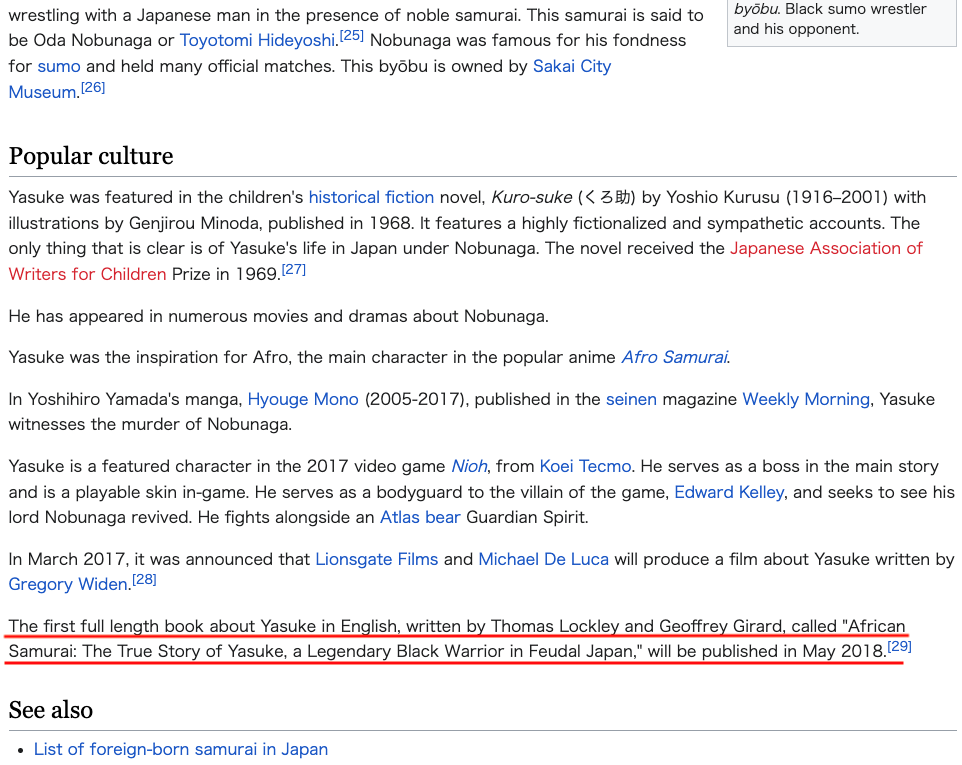
The first full-length book about Yasuke in English, written by Thomas Lockley and Geoffrey Girard, called “African Samurai: The True Story of Yasuke, a Legendary Black Warrior in Feudal Japan,” will be published in May 2018.
Cited from: https://en.wikipedia.org/w/index.php?title=Yasuke&oldid=880150642
The publication date is actually 2019, so “2018” is incorrect.

How could you get that wrong?
This entry, along with several others, was removed over a month later.
Afterward: Tottoritom disappears
This account became inactive. It is speculated that the reason for this was Thomas Lockley’s frequent appearances on prominent platforms like CNN and BBC following the Yasuke boom in 2019.
However, the situation where Yasuke fans continue to write their wishful thoughts on Wikipedia based on news articles, Britannica, and Lockley’s book persists to this day.
Did Thomas Lockley Use Wikipedia for Research Presentation?
In an interview with the Refugee Support Association, he mentioned:
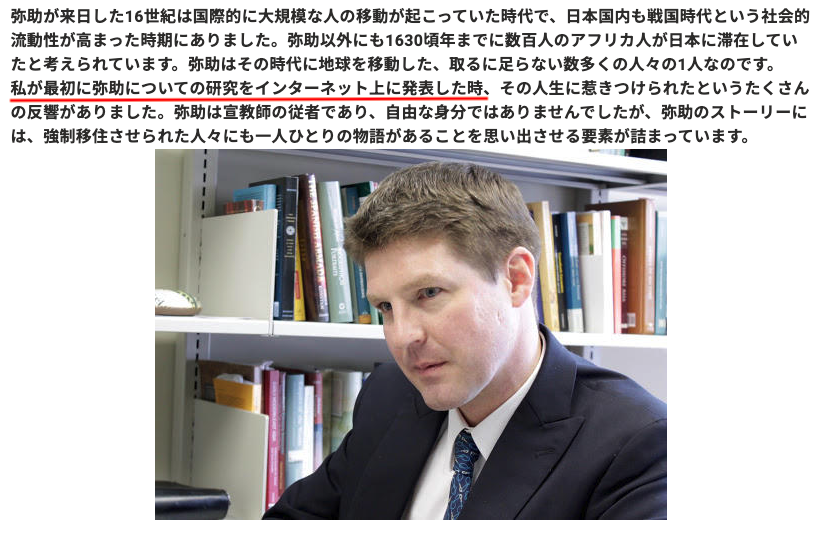
私が最初に弥助についての研究をインターネット上に発表した時、その人生に惹きつけられたというたくさんの反響がありました。弥助は宣教師の従者であり、自由な身分ではありませんでしたが、弥助のストーリーには、強制移住させられた人々にも一人ひとりの物語があることを思い出させる要素が詰まっています。
Translation:
Cited from: https://www.refugee.or.jp/report/activity/2020/02/post_501/
When I first published my research on Yasuke online, there was a lot of response from people who were drawn to his life. Although Yasuke was not a free man but a servant to a missionary, his story is filled with elements that remind us that even forcibly displaced people have their own stories.
Published online…? Does this mean Wikipedia? If he was using it as a platform for his own speculative research, it would be quite annoying. Wikipedia prohibits original research.
Thomas Lockley’s Current Rewrite of Britannica
Just yesterday, Yasuke’s page on Britannica was overwritten by a mysterious person claiming to be Thomas Lockley.
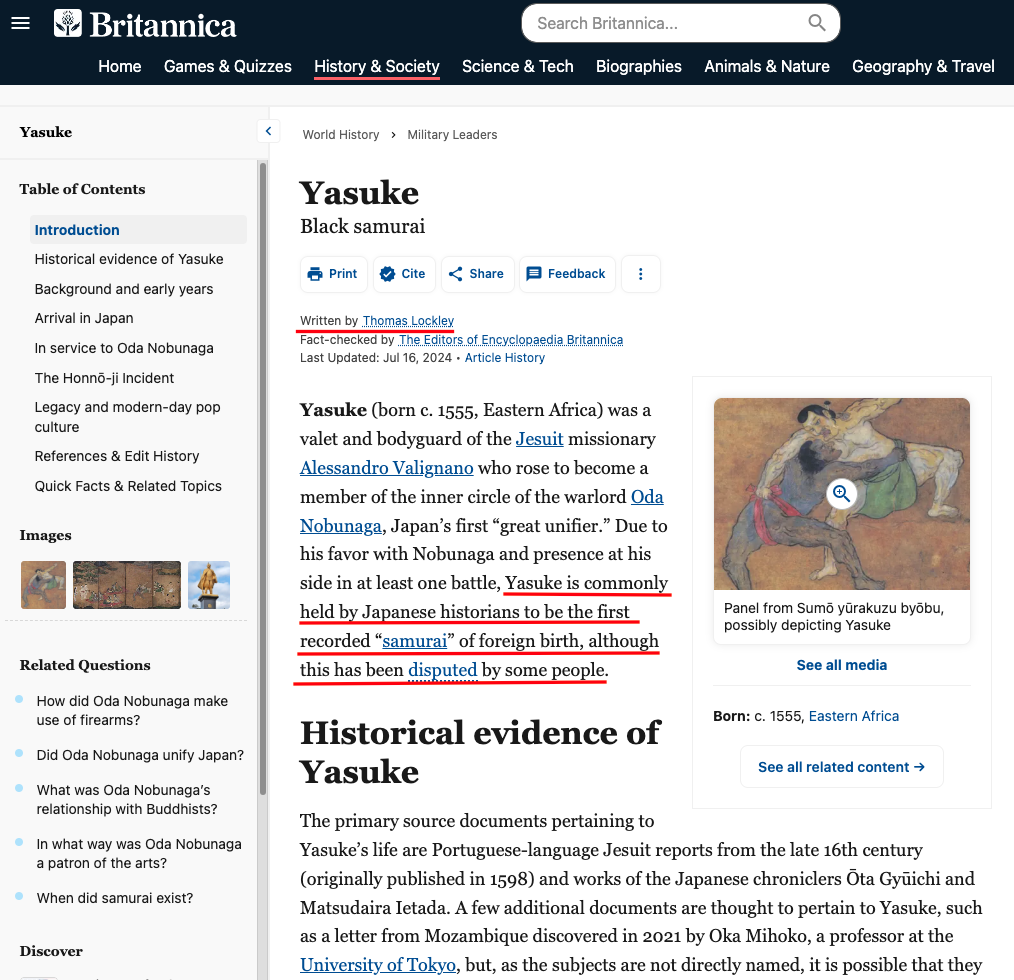
He still claims:
Yasuke is commonly held by Japanese historians to be the first recorded “samurai” of foreign birth, although this has been disputed by some people.
Cited from: https://www.britannica.com/biography/Yasuke
However, Professor Mihoko Oka, the editor of “つなぐ世界史 Connecting World History 2,” says:
日本人の研究者でも「侍」の定義には諸説あるので、回答が難しいですが。海外での「サムライ」使用はまたさらに異なり。ロックリー氏以前に「弥助」に学術的な関心を持った人がいないため、厳密に戦国時代の「侍」の定義を確定させた上で、「弥助」を「侍」と位置づけた研究者はいないのではないかと
Translation:
https://x.com/mei_gang30266/status/1813421926444155128
Even among Japanese researchers, there are various theories on the definition of “samurai,” making it difficult to answer. The use of “samurai” overseas is even more different. Since no one before Prof. Lockley had shown academic interest in “Yasuke,” there would be no researchers who have strictly defined “samurai” in the Sengoku period and then positioned “Yasuke” as “samurai.”
Despite this significant issue, what is he doing now? Editing Britannica is hardly his priority.

A bit scary
Lockley’s Influence on the Public Abroad
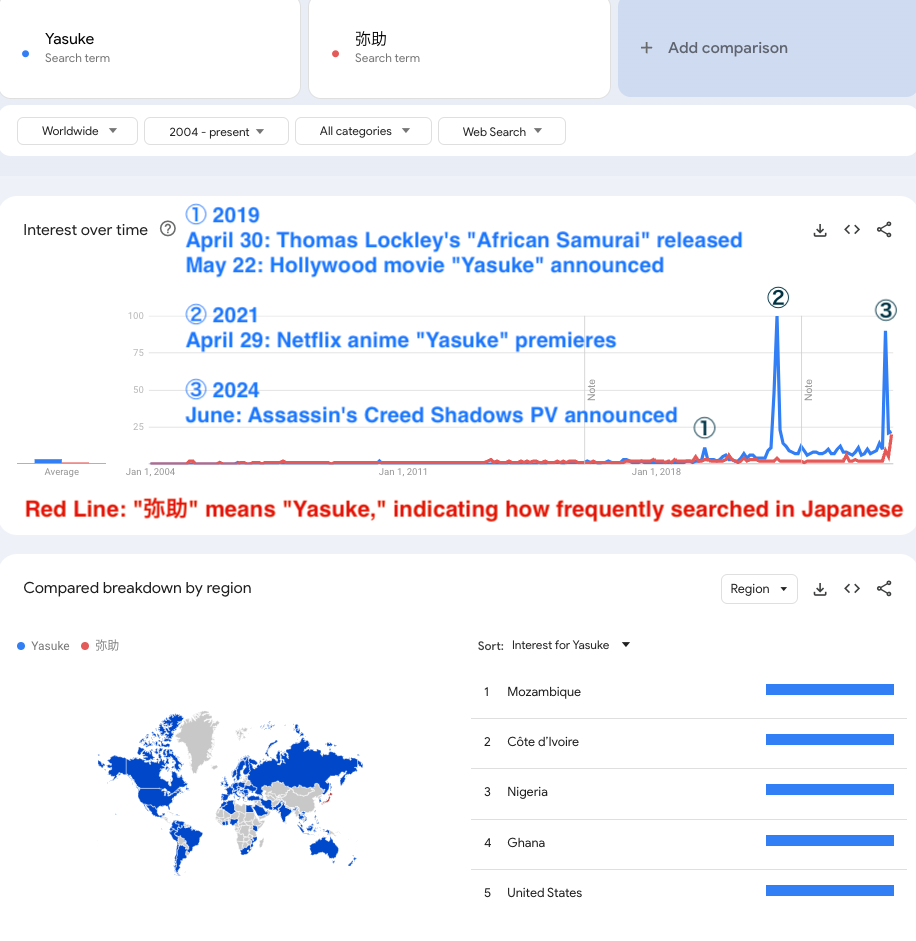
The above graph shows the results of searches for Yasuke(弥助) on Google. It is clear that this previously unknown minor historical figure in Japan suddenly became famous abroad.
Wikipedia is very convenient. Most people use it thinking the content is generally accurate, and unless they’re experts in the field, they don’t often read it skeptically. In this sense, Lockley’s impact on the public is immeasurable.
In fact, many overseas media and other online encyclopedias introduce an incorrect image of Yasuke. Given that reporters can only corroborate from English-written Wikipedia, Lockley’s book, and other English news articles, it’s understandable that they might make mistakes.
- BBC – Yasuke: The mysterious African samurai
- CNN – African samurai: The enduring legacy of a black warrior in feudal Japan
- Time – The True Story of Yasuke, the Legendary Black Samurai Behind Netflix’s New Anime Series
- Smithsonian Magazine – Who Was Yasuke, Japan’s First Black Samurai?
- Britannica – Yasuke (*current version has been overwritten by Lockley)
Foreign Yasuke fans, believing these sources, have thought “Yasuke was indeed a historical samurai,” or “Japanese people are racists for not highlighting Yasuke.”
On the other hand, since Japanese people were unaware that Yasuke had become a legendary samurai overseas, they felt that foreign companies and people were imposing their DEI (Diversity, Equity, Inclusion) onto Japanese history.
Look at the article “Where Are The Black People in ‘Shogun’?“, regarding the movie ‘Shogun‘.
There’s a Japanese proverb that says for a Samurai to be brave, he must have a bit of Black blood. If that’s the case, FX’s monster hit ‘Shogun’ has a lot of scared swordsmen
Cited from: https://www.levelman.com/where-black-people-fx-shogun/

There’s no such proverb!?!?!?!?!?
I ask the question now that I naively didn’t ask in 1980. Where are the Black people?
I don’t ask out of a desire to see representation when it wasn’t historically accurate. I inquire because there were Black people in Japan in 1600 and before, though Japan could teach Florida a thing or two about rewriting history. According to multiple sources, one of the early real-life Shoguns, Sakanoue no Tamuramaro (758–811), was Black, though denied by others.
Cited from: https://www.levelman.com/where-black-people-fx-shogun/
To Japanese people, such claims are absurd and ridiculous, but to foreigners, they might have sounded plausible.
However, the above graph clearly shows that Yasuke was genuinely unknown and not highlighted in Japan. The lack of records and attention in Japan itself proves that he wasn’t a “historical legendary samurai.”
The origin of the proverb in question is detailed here. Are there other Japanese proverbs or legends that even Japanese people don’t know about around the world?
Conclusion: Thomas Lockley Rewrote History on Wikipedia, and the World Was Deceived
Tottoritom, believed to be Thomas Lockley, posted his unpublished original research on Wikipedia. He might have used it as a platform to present his research findings (which is against the rule).
The fact that Yasuke became noted, dramatized, and deified only outside Japan is evident from the Google search data. Foreign Yasuke fans would have believed his descriptions on Wikipedia, or the news articles and online encyclopedias that used Wikipedia as a reference.
Lockley did understand everything. He knew that few foreigners could read Japanese and few Japanese could read English. He also realized that domestic experts in Japanese history wouldn’t bother reading English books. It’s still hard to believe that, over several years, he created the myth of a legendary black samurai that exists only outside of Japan.
The truth is, I didn’t want to disappoint those who believe Yasuke was a legendary samurai. I was just interested in historical facts. I hope Lockley faces appropriate consequences from the academic community for misleading those people.
Honestly, however, watching the fabrication of Yasuke’s story was interesting for me. It was also a great chance to learn about the inner workings of Wikipedia. While some say this incident has damaged Wikipedia’s credibility, I actually admire the dedication of the contributors who strive to uncover the truth. I do wish there were better systems to improve information accuracy.
By the way, although we now know how Lockley altered Yasuke’s history, we still don’t understand why he did it. In the next part, I’ll explore his possible motives.



